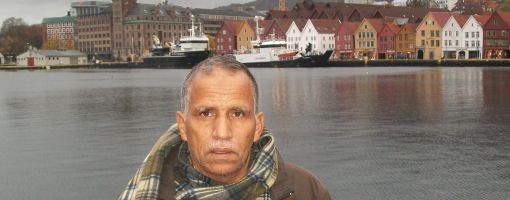
Former Rafto laureate criticised lack of openness in Moroccan courts at a seminar in Center for Middle Eastern Studies in Bergen, Norway. He was himself denied access to a court last month.
12 October, a group of policemen stopped Daddach from entering the 2nd court of appeal in El Aaiun. He said the men, 12 of them in total, were civilian dressed, and standing in the doorway to the court. According to Daddach, he was insulted and threatened on his life.
“The courts should be public. According to Moroccan law, it is not forbidden to enter the courts. Anyone should have the right to get access”, Daddach stated.
The activist tried to attend during the announcement of the sentence of a Moroccan policeman, convicted for shooting and killing the Saharawi man Said Dambar in December 2010.
Daddach deposited a complaint to the court following the incident.
He told that several similar episodes have taken place in which Saharawi human rights activists are not allowed entry to courts.
He said it also applies to the so-called Group of 23 in Salé prison, a group of Saharawi activists imprisoned following the violent dismantlement of the Gdeim Izik protest camp outside of El Aaiun, autumn 2010. That group is only allowed to bring in one member of their own family - not other human rights defenders - in their court process. Daddach tells that he had been explained by the deputy general of prisons in Morocco that his participation in the Group of 23 processes was forbidden. Other groups are said to have been told the same.
Apparently, the closed-door-trend is particularly usual in cases where leading human rights figures are before the courts, according to Daddach. For instance, the ban of entry of activists applied in the case of Ali Salem Tamek, Brahim Dahane and Ahmed Nassiri earlier this year.
As for the policeman who received sentence behind closed doors, he was sentenced to 15 years for the offence.
NY Check new Western Sahara poster!
“Try to Visit Western Sahara”…
The Security Council fails Western Sahara and international law
On 31 October 2025, a new resolution was adopted in the UN Security Council calling on the Saharawis to negotiate a solution that would entail their incorporation into the occupying power, Morocco.
Saharawis Demonstrate Against Trump Proposal
The United States has proposed in a meeting of the UN Security Council on Thursday that the occupied Western Sahara be incorporated into Morocco.
Skretting Turkey misled about sustainability
Dutch-Norwegian fish feed giant admits using conflict fishmeal from occupied Western Sahara. Last month, it removed a fake sustainability claim from its website.



